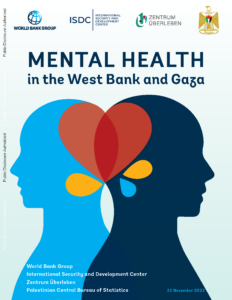More than half of the adult population in the West Bank and Gaza screen positive for depression. In Gaza specifically, the rate climbs to 71%.
This is shown in the new report Mental Health in the West Bank and Gaza – a joint effort by the Palestinian Central Bureau of Statistics (PCBS), the World Bank, ISDC, and Zentrum Überleben.
Key findings
The new study is based on the analysis of a nationally representative survey of 5,876 individuals and presents four key findings:
- The prevalence of mental health problems in the West Bank and Gaza is very high.
- Many mental health issues vary systematically across areas and socio-economic characteristics.
- Poor mental health is closely linked with worse economic outcomes.
- Poor mental health is strongly associated with exposure to violent conflict and traumatic events.
More than a quarter of survey respondents reported having been exposed to conflict-related trauma; with one in ten reported having experienced conflict-related trauma in the last three years.
Some groups appear more vulnerable than others. The highest rate of PTSD symptoms is present in the youngest age group of the survey (18 – 29). This is particularly concerning, because the data also shows that higher PTSD and depression symptom severity is connected with worse economic outcomes and decreases in life satisfaction (which negatively impact food security).
Perceived poverty, in turn, is connected to higher risk of mental health problems and aggression – potentially feeding into a vicious circle for young people.
Policy suggestions
In the report, we also offer suggestions.
Policymakers can improve the effectiveness of their aid by targeting specific sub-groups that are more vulnerable – such as households that are both poorer and have high exposure to violence.
Specifically targeting the mental health crisis also creates opportunities. By combining traditional livelihood interventions with programs designed specifically to tackle mental health challenges, we can create lasting potential benefits, beyond immediate health impacts. More specifically, we see the need for interventions that mitigate the consequences of trauma exposure, as they encourage healthy participation in social and economic life.
Publication Details
- Year of Publication: 2023
- Region/s: Middle East & North Africa
- Theme/s: Humanitarian Emergencies · Impact Evaluation · Individual Decision-making · Micro-Data Collection · Shocks & Livelihoods
- Research Topic/s: Disasters & Emergencies · Employment · Health · Violence & Conflict · Youth & Children






